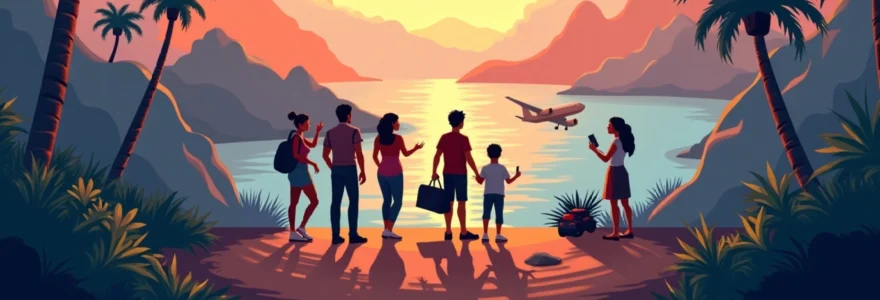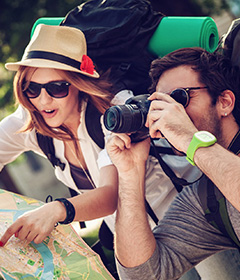Travel has long been celebrated as a transformative experience, opening our eyes to new cultures, perspectives, and ways of life. Yet, the true magic of travel often lies not just in the journey itself, but in the sharing of those experiences with others. From recounting tales of adventure to friends back home to connecting with fellow travellers on the road, the act of sharing amplifies the value of our travels in profound ways.
The digital age has revolutionised how we document and share our travels, creating a global community of explorers connected through stories, images, and shared wisdom. This interconnectedness not only enriches our individual experiences but also shapes the very nature of travel itself, influencing destinations, local economies, and cultural exchanges worldwide.
Psychological impact of shared travel narratives
The act of sharing travel experiences taps into fundamental aspects of human psychology, enhancing our enjoyment and memory of trips long after we’ve returned home. When we recount our adventures to others, we’re not just reliving those moments; we’re reinforcing neural pathways associated with positive emotions and creating deeper, more lasting memories.
Research in cognitive psychology suggests that the act of storytelling about our travels helps to consolidate memories, making them more vivid and accessible over time. This process, known as memory consolidation , is further enhanced when we receive positive feedback or engage in discussions about our experiences, creating a social reinforcement of our memories.
Sharing travel stories isn’t just about reliving the past; it’s about strengthening our connection to those experiences and deepening our understanding of their impact on our lives.
Moreover, the anticipation of sharing can enhance the travel experience itself. Knowing that we’ll have the opportunity to recount our adventures to an interested audience can make us more attentive to details and more open to new experiences during our trips. This heightened awareness can lead to a richer, more immersive travel experience overall.
Digital platforms revolutionizing travel experience sharing
The digital revolution has transformed the landscape of travel experience sharing, providing platforms that allow travellers to connect, inspire, and inform one another on an unprecedented scale. These digital tools have not only changed how we plan and document our trips but have also created new forms of travel narratives and communities.
Instagram’s role in visual travel storytelling
Instagram has emerged as a powerhouse in visual travel storytelling, allowing users to share stunning imagery and short-form video content from their adventures. The platform’s emphasis on aesthetics has influenced travel trends, with certain destinations and experiences gaining popularity due to their “Instagram-worthiness”.
However, the impact of Instagram goes beyond mere aesthetics. Through features like Stories and IGTV, travellers can provide more in-depth, behind-the-scenes looks at their journeys, offering followers a more authentic and comprehensive view of different destinations and cultures.
Tripadvisor’s influence on collaborative trip planning
TripAdvisor has revolutionised the way travellers plan their trips and share their experiences. The platform’s user-generated content model allows travellers to access a wealth of firsthand information about destinations, accommodations, and activities. This collaborative approach to trip planning has democratised travel information, empowering travellers to make more informed decisions based on the collective experiences of others.
The impact of TripAdvisor extends beyond individual travellers to influence the travel industry as a whole. Businesses in the tourism sector now pay close attention to their TripAdvisor ratings and reviews, often adapting their services in response to user feedback.
Facebook groups as travel community hubs
Facebook Groups have emerged as vibrant hubs for travel communities, providing spaces for like-minded travellers to connect, share advice, and discuss their experiences. These groups range from broad travel enthusiast communities to niche groups focused on specific types of travel, destinations, or traveller demographics.
The real-time nature of Facebook Groups allows for dynamic exchanges of information, with members able to ask questions, share recommendations, and even arrange meet-ups with fellow travellers. This sense of community extends the social aspect of travel beyond the trip itself, creating ongoing connections and fostering a global network of travellers.
Youtube’s impact on immersive travel vlogs
YouTube has transformed travel storytelling through the rise of travel vlogs, offering viewers immersive, long-form content that captures the essence of destinations and travel experiences. These vlogs often provide a more personal and authentic perspective on travel, allowing viewers to vicariously experience different cultures and adventures.
The platform’s ability to host detailed, high-quality video content has also made it a valuable resource for practical travel information, with vloggers sharing in-depth guides, tips, and reviews that can significantly influence viewers’ travel decisions and expectations.
Cultural exchange through shared travel experiences
One of the most profound impacts of sharing travel experiences is its role in fostering cultural exchange and understanding. When travellers share their encounters with different cultures, they become unofficial ambassadors, bridging gaps in understanding and challenging preconceptions.
This exchange goes both ways. As travellers share their experiences of a destination, they also bring elements of their own culture to the places they visit. This cross-pollination of ideas, customs, and perspectives contributes to a more interconnected and empathetic global community.
Travel is a powerful tool for breaking down cultural barriers, and the sharing of travel experiences amplifies this effect, creating ripples of understanding that extend far beyond the traveller’s immediate circle.
Moreover, the act of sharing travel experiences can inspire others to explore new destinations and cultures, creating a cycle of cultural exchange and global awareness. This can lead to more responsible and culturally sensitive travel practices, as travellers become more aware of their impact on the destinations they visit.
Economic benefits of Experience-Sharing in tourism
The sharing of travel experiences has significant economic implications for the tourism industry and local economies worldwide. As travellers share their stories and recommendations, they influence the travel decisions of others, potentially directing tourism flows and spending patterns.
Airbnb’s Experience-Sharing model
Airbnb’s platform has revolutionised not only accommodation but also the way travellers engage with local experiences. The company’s Experiences feature allows locals to offer unique activities and tours, providing travellers with authentic, immersive experiences while creating new economic opportunities for residents.
This model of experience-sharing has democratised the tourism industry, allowing individuals to benefit directly from tourism without the need for significant capital investment. It has also diversified the range of experiences available to travellers, often leading them off the beaten path and distributing tourism benefits more widely within communities.
Local guide programs: google maps and beyond
Programs like Google’s Local Guides have harnessed the power of user-generated content to enhance mapping and local information services. These programs incentivise users to share reviews, photos, and information about local businesses and attractions, creating a rich, community-driven resource for travellers.
The economic impact of these programs is multifaceted. They provide valuable exposure for local businesses, particularly small or niche establishments that might otherwise struggle to reach a global audience. Additionally, by improving the quality and quantity of information available to travellers, these programs can encourage more confident exploration of destinations, potentially increasing overall tourism activity and spending.
Influence of travel bloggers on destination economics
Travel bloggers and social media influencers have emerged as powerful forces in shaping travel trends and destination popularity. Their shared experiences can spotlight lesser-known destinations, revitalise interest in established tourist spots, and significantly influence their followers’ travel decisions.
This influence can have substantial economic impacts on destinations. A viral blog post or social media campaign can drive sudden increases in tourism, creating both opportunities and challenges for local economies. Destinations and tourism boards increasingly recognise the value of collaborating with influencers to shape their brand image and attract visitors.
Memory enhancement through collective travel narratives
The act of sharing travel experiences doesn’t just benefit potential future travellers; it also enhances the memories and understanding of the travellers themselves. When we share our stories, we often gain new perspectives on our experiences through the reactions and insights of others.
Collective storytelling, where multiple travellers share their experiences of the same destination or event, can create a richer, more nuanced understanding of a place or culture. This collaborative narrative-building can help travellers process and contextualise their experiences more deeply.
Furthermore, the digital preservation of travel narratives through blogs, social media posts, and online communities creates a lasting record of personal and collective travel histories. These digital archives serve not only as personal mementos but also as valuable resources for future travellers and researchers studying travel trends and cultural exchanges over time.
Sustainable tourism practices promoted by shared experiences
As awareness of tourism’s environmental and social impacts grows, the sharing of travel experiences has become a powerful tool for promoting sustainable travel practices. Travellers who have witnessed the effects of overtourism or environmental degradation firsthand often become advocates for more responsible travel.
Social media and travel blogs have become platforms for raising awareness about sustainable tourism practices, from reducing plastic waste to supporting local economies. Travellers share tips on eco-friendly accommodations, responsible tour operators, and ways to minimise one’s carbon footprint while exploring the world.
This collective sharing of sustainable travel practices has the potential to shift industry norms and consumer behaviour towards more responsible forms of tourism. As travellers become more informed about the impacts of their choices, they can make more conscious decisions about how and where they travel.
Moreover, the sharing of positive experiences with sustainable tourism options can help dispel myths that eco-friendly travel is less enjoyable or more difficult, encouraging more travellers to adopt these practices. This grassroots movement, driven by shared experiences and recommendations, complements and often surpasses official sustainability initiatives in its reach and impact.
In conclusion, the sharing of travel experiences transcends mere storytelling. It’s a powerful force that enhances personal memories, fosters cultural understanding, drives economic development, and promotes sustainable practices. As digital platforms continue to evolve, the ways in which we share our travels will undoubtedly transform, but the fundamental value of these shared narratives in enriching our global community will remain constant.


